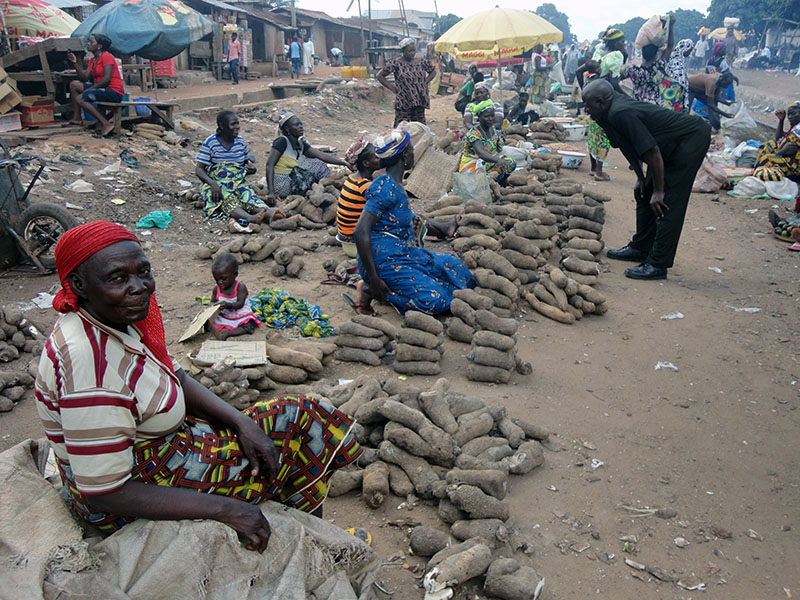Economy
Nigerian Yams Not Rejected Abroad—Exporters

By Modupe Gbadeyanka
The exporters of yam to the United Kingdom and the United States have disputed the reports, initially aired by the Africa Independent Television (AIT), purporting that the yams exported after the official flag-off ceremony on June 29, 2017 were rejected at their export destinations.
The symbolic event, done at the Lilypond Container Terminal in Lagos by the Minister of Agriculture and Rural Development, Mr Audu Ogbeh, meant to boost the morale of Nigerian exporters and make a bold statement to the global marketplace, has drawn widespread criticisms on various media platforms.
A statement issued by the Minister’s Special Adviser on Media and Communications, Mr Olukayode Oyeleye, stated that the concerned exporters and other prospective exporters have expressed worries about the potential impact of the negative publicity on their prospects at the export market in the wake of federal government’s initiative on diversification of the economy through agricultural produce export.
Most commentators and analysts in the mainstream and social media have retailed the negative aspect of the laudable initiative and have played up the wrong versions of the export story. Discussions with the exporters have since shown the prevailing storyline as inappropriate and misleading.
First, the exporters to the UK and US have emphatically said that their consignments were successfully cleared at the ports and delivered them to their various warehouses. They said, although some cases of tuber spoilage were reported in both cases, these were separated from the good ones, and the good ones were distributed to the buyers.
The exporters noted that Ghana, which has been exporting yams for a while, routinely records cases of spoilage, without making any public issues therefrom; and their yams don’t get rejected as a result.
Mr Michael Adedipe of ADES UK Foods and Drinks for the UK, whose warehouse was visited by AIT, has deplored the AIT report and other subsequent commentaries about rejection of his yams by the UK authorities.
Mr Adedipe has said emphatically that the consignment was not rejected; “It was cleared.”
According to Mr Adedipe, who confirmed that he spoke to AIT, “I’ve watched the (TV) programme which lasted for about two hours. All the positive stuff removed. We that decide to venture in this project are aware of the risks involved because, this fresh produce … we’ll expect five or 10 percent damages. I don’t know why they said the product got rejected. I’ve sent my release note. I’ve sent video of loading. I’ve sent every documentation to say that there is no issue like that at all.”
On the spoilage of yam, Mr Adedipe explained that “the failure has nothing to do with the Ministry of Agriculture, but the Nigerian Ports Authority (NPA). That’s where I see the failure.”
He expressed disgust at the mishandling of his comments by the AIT reporter, saying: “I told him, he is aware of it. He knew about the delay, I told him about all the consignment. He knew every single thing that happened. But what he did the most is to use all the negative stuff. We talked about other things. I told him how I came into the UK to go and fix our problem. All those were removed from the report.”
Mr Adedipe, who has vowed not to stop yam export business, disclosed that “the other mistake was the shipping line we used. But they were the ones that were available.”
According to him, in spite of the sour experience with media report, “I’m willing to invest. I still expect…at least to take a container from Nigeria every week.”
Managing Director of Wan Nyikwagh Farms Nigeria Limited, Mr Yandev Amaabai, has strongly disputed the yam rejection story and said it doesn’t even tally.
“The story from AIT was focused on the UK. So far, I am the only person who has lifted yam to the US. Whatever we can do to clarify this issue will be good. We learn as we progress. The whole idea that government brought was to diversify the economy.”
“My goods actually got to the US on September 7, 2017. The ship berthed on September 2, 2017, but, because of the flooding in Texas, we couldn’t discharge until the 7th. They were cleared from the Customs and brought to the warehouse on the 7th. Yams are perishable items and, definitely, some may go bad on the way. But, this statement that says the American government rejected Nigerian yams, where does it come from?
“Our yams were released to us and we took them to the stores. We sorted out our yams when they got there. We distributed them to the off-takers. So, where they got this story from, I don’t know. Nobody has ever called from anywhere, even in the US, to ask me question. If a few yams got rotten, and I am not complaining, why are people crying more than the owner? I have all the papers. The Customs cleared my goods on the other side. And these things went to my warehouse from where we distributed.”
If Ghana, which produces 4.8 million tonnes of yams, according to 2008 estimates, occupies a niche as the leading exporter of crop, accounting for over 94 percent of total yam exports in West Africa, Nigeria which is by far the world’s largest producer of yams, accounting for over 70 to 76 percent of the world production, producing 35.017 million metric tonnes valued equivalent of $5.654 billion by the 2008 estimates should do better than Ghana in the export market
Ghana is the first country in West Africa to launch its national yam development strategy in 2013. The country aims at US$5billion dollars of exports by 2018. Nigeria, which produces seven times Ghana’s production volume, is beset with criticisms over attempts to bring it to the global yam markets. About 90 per cent of Ghana’s yams are exported to the US, Canada, UK and elsewhere in Europe. There are more Nigerians than Ghanaians in these countries, meaning more prospects for Nigerian exporters.
Mr Ogbeh has said that Nigeria, the largest producer of yam in the world, is not anywhere near the capacity to export and remains so much a nation of consumers.
He stressed that “Nigeria must export” as the “country’s economy is increasing, and in ten years’ time, oil and gas is going to drop. Then we may have nothing to earn foreign exchange except we begin to diversify our export base now.”
With all these prospects in view, the Minister expressed surprise at the negative news trailing his effort at putting Nigeria on the global yam export market, saying “we’re not going to stop because this is not enough to demoralise us. We have food to export. Never mind what so-called critics are doing.”
“In the ministry of agriculture,” he said, “we are not exporters. The ministry does not export. We’re going to talk to the port authority on cooling vans for vegetables and fresh produce so that exporters don’t lose money and we don’t lose face. We should begin to build cold trucks that are temperature-controlled to keep the yams till the time they have to go. We should invest in special containers for their storage.”
“If other countries are doing it, we too can do it. We’re trying to take over the market. We’ve come to nearly 70 per cent of raw output of yams. Why can’t Nigerians in Texas, Canada, London and Germany have access to the yams?”
The Minister vowed that “we will go ahead with our efforts to export yam. We will not let this opportunity slip any further. We are determined to position our people to capture the investment opportunities and benefits in the yam export to these countries. We will fix the yam export value chain. We have the volume and the market.”
“We will emphasise global best practices, engage with world class experts and international organisations as well as leverage the strength in indigenous knowledge. We will support investment in relevant infrastructure and facilities.
“We will revive the abandoned yam conditioning centres in Ekiti and Nassarawa states while we encourage the construction of new ones with appropriate equipment to boost storage and export prospects. We appeal to Nigerians, in the spirit of patriotism, to see the silver lining around the cloud of the week of misinformation about yam export.
“We have commenced engagement with the National Assembly for the repeal of the 1989 law that prohibits export of yams and other agro-commodities.
“Currently, the bill has passed the second reading at the National Assembly. The continued existence of this law is an obstruction against the economic diversification and export initiative of this administration. We plead with the National Assembly to fast-track the repeal of the law and help us further unlock our export potential,” he said.
Economy
NBA Demands Suspension of Controversial Tax Laws

By Modupe Gbadeyanka
The federal government has been asked by the Nigerian Bar Association (NBA) to suspend the implementation of the controversial tax laws.
In a reaction to the tax reform acts, the president of the group, Mr Afam Osigwe (SAN), the suspension of the laws would allow for a proper investigation into allegations of alterations in the gazetted and harmonised copies.
A member of the House of Representatives, Mr Abdussamad Dasuki, alleged that some parts of the laws passed by the parliament were different from the gazetted copy.
To address the issues raised, the NBA said it is “imperative that a comprehensive, open, and transparent investigation be conducted to clarify the circumstances surrounding the enactment of the laws and to restore public confidence in the legislative process.”
“Until these issues are fully examined and resolved, all plans for the implementation of the Tax Reform Acts should be immediately suspended,” the association declared.
It noted that the controversies “raise grave concerns about the integrity, transparency, and credibility of Nigeria’s legislative process.”
“These developments strike at the very heart of constitutional governance and call into question the procedural sanctity that must attend lawmaking in a democratic society,” it noted.
“Legal and policy uncertainty of this magnitude has far-reaching consequences. It unsettles the business environment, erodes investor confidence, and creates unpredictability for individuals, businesses, and institutions required to comply with the law. Such uncertainty is inimical to economic stability and should have no place in a system governed by the rule of law.
“Nigeria’s constitutional democracy demands that laws, especially those with profound economic and social implications, emerge from processes that are transparent, accountable, and beyond reproach. Anything short of this undermines public trust and weakens the foundation upon which lawful governance rests.
“We therefore call on all relevant authorities to act swiftly and responsibly in addressing this controversy, in the overriding interest of constitutional order, economic stability, and the preservation of the rule of law,” the organisation stated.
Economy
MRS Oil, Two Others Raise NASD Bourse Higher by 0.52%

By Adedapo Adesanya
Demand for hot stocks, including MRS Oil Plc, buoyed the NASD Over-the-Counter (OTC) Securities Exchange by 0.52 per cent on Tuesday, December 23.
The energy company was one of the three price gainers for the session as it chalked up N19.69 to sell at N216.59 per share versus the previous day’s value of N196.90 per share.
Further, FrieslandCampina Wamco Nigeria Plc gained N2.95 to close at N56.75 per unit versus N53.80 per unit and Golden Capital Plc appreciated by 84 Kobo to N9.29 per share from Monday’s N8.45 per share.
Consequently, the market capitalisation went up by N10.95 billion to N2.125 trillion from N2.125 trillion and the NASD Unlisted Security Index (NSI) rose by 18.31 points to 3,570.37 points from 3,552.06 points.
Yesterday, the NASD bourse recorded a price loser, the Central Securities Clearing System Plc (CSCS), which gave up 17 Kobo to close at N33.70 per unit against the previous trading value of N33.87 per unit.
The volume of securities traded at the session went down by 97.6 per cent to 297,902 units from the previous day’s 12.6 million units, the value of securities decreased by 98.5 per cent to N10.5 million from N713.6 million, and the number of deals remained flat at 32 deals.
By value, Infrastructure Credit Guarantee Company (InfraCredit) Plc ended as the most actively traded stock on a year-to-date basis with 5.8 billion units exchanged for N16.4 billion. This was followed by Okitipupa Plc, which traded 178.9 million units valued at N9.5 billion, and MRS Oil Plc with 36.1 million units worth N4.9 billion.
In terms of volume, also on a year-to-date basis, InfraCredit Plc led the chart with a turnover of 5.8 billion units traded for N16.4 billion. Industrial and General Insurance (IGI) Plc ranked second with 1.2 billion units sold for N420.7 million, while Impresit Bakolori Plc followed with the sale of 536.9 million units valued at N524.9 million.
Economy
NGX All-Share Index Soars to 153,354.13 points

By Dipo Olowookere
It was another bullish trading session for the Nigerian Exchange (NGX) Limited as it closed higher by 0.59 per cent on Tuesday.
The market further rallied due to continued interest in large and mid-cap stocks on the exchange by investors rebalancing their portfolios for the year-end.
Yesterday, Aluminium Extrusion sustained its upward trajectory after it further appreciated by 9.96 per cent to N14.90, as Austin Laz gained 9.81 per cent to close at N2.91, Custodian Investment improved by 9.69 per cent to N38.50, and First Holdco soared by 9.35 per cent to N50.30.
Conversely, Royal Exchange declined by 7.22 per cent to N1.80, Champion Breweries shrank by 6.57 per cent to N15.65, NASCON lost 5.36 per cent to trade at N105.05, Sovereign Trust Insurance depreciated by 5.28 per cent to N3.77, and Japaul went down by 4.51 per cent to N2.33.
At the close of business, 29 shares ended on the gainers’ table and 27 shares finished on the losers’ log, representing a positive market breadth index and bullish investor sentiment.
This raised the All-Share Index (ASI) by 895.06 points to 153,354.13 points from 152,459.07 points and lifted the market capitalisation by N579 billion to N97.772 trillion from the previous day’s N97.193 trillion.
VFD Group finished the day as the busiest stock after it recorded a turnover of 192.0 million units worth N2.1 billion, GTCO exchanged 63.5 million units valued at N5.6 billion, Access Holdings traded 49.8 million units for N1.0 billion, First Holdco sold 45.8 million units valued at N2.3 billion, and Secure Electronic Technology transacted 38.3 million units worth N28.4 million.
In all, market participants bought and sold 677.4 million units valued at N20.8 billion in 27,589 deals compared with the 451.5 million units worth N13.0 billion traded in 33,327 deals on Monday, showing an improvement in the trading volume and value by 50.03 per cent and 60.00 per cent apiece, and a shortfall in the number of deals by 17.22 per cent.
-

 Feature/OPED6 years ago
Feature/OPED6 years agoDavos was Different this year
-
Travel/Tourism9 years ago
Lagos Seals Western Lodge Hotel In Ikorodu
-

 Showbiz3 years ago
Showbiz3 years agoEstranged Lover Releases Videos of Empress Njamah Bathing
-

 Banking8 years ago
Banking8 years agoSort Codes of GTBank Branches in Nigeria
-

 Economy3 years ago
Economy3 years agoSubsidy Removal: CNG at N130 Per Litre Cheaper Than Petrol—IPMAN
-

 Banking3 years ago
Banking3 years agoFirst Bank Announces Planned Downtime
-

 Banking3 years ago
Banking3 years agoSort Codes of UBA Branches in Nigeria
-

 Sports3 years ago
Sports3 years agoHighest Paid Nigerian Footballer – How Much Do Nigerian Footballers Earn

















